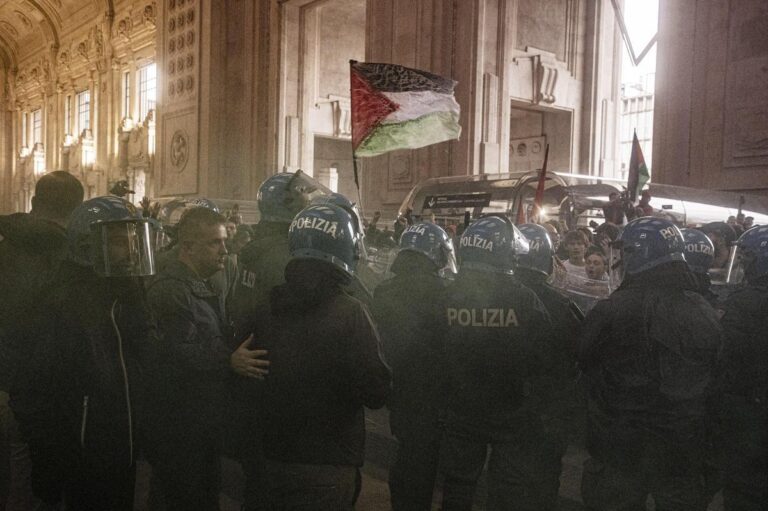Thousands of Italian workers participated in nationwide strikes on Tuesday, disrupting transportation, manufacturing, and public services in a show of solidarity with Gaza. The coordinated labor action, organized by several major unions, underscores growing international concern over the ongoing conflict in the region. As disruptions ripple across Italy, the strikes highlight the intersection of global politics and domestic labor movements, drawing attention to the humanitarian crisis affecting Gaza’s civilian population.
Italian Workers Strike in Solidarity with Gaza Causes Nationwide Disruptions
The coordinated walkout by labor unions across Italy has brought significant interruptions to multiple sectors, reflecting the strong political stance taken by workers in support of Gaza. Public transportation systems in major cities like Rome, Milan, and Naples experienced widespread delays and cancellations, while port operations saw a marked slowdown. Essential services, including postal deliveries and waste management, have also encountered disruptions, causing ripples throughout urban and rural communities alike. Union leaders emphasize that this solidarity strike aims to raise awareness about humanitarian concerns and demand international intervention in Gaza.
Key impacts observed during the strike include:
- Over 70% of public transport routes delayed or canceled
- Major port activities reduced by approximately 50%
- Shutdowns in the manufacturing and logistics sectors
- Reduced operations in communication services
| Sector | Impact Level | Duration |
|---|---|---|
| Public Transport | High | Ongoing |
| Ports & Shipping | Moderate | 48 hours |
| Manufacturing | Moderate | 24 hours |
| Postal Services | Low | Ongoing |
Impact on Transportation and Public Services Amid Widespread Labor Actions
Transportation networks across Italy faced severe delays and cancellations as workers from various sectors participated in the nationwide strike. Major cities reported reduced metro and bus services, leading to significant commuter frustration and overcrowded alternative transit options. Airports experienced a ripple effect, with some flights delayed due to ground crew shortages, while rail operators struggled to maintain regular schedules. Emergency services, although exempt from the strike, reported logistical challenges navigating through congested urban centers impacted by mass protests and picket lines.
Public services also bore the brunt of this coordinated labor action. Municipal waste collection was interrupted in several regions, causing mounting refuse in public spaces, while administrative offices encountered backlogs as many employees stayed away. The table below highlights the immediate effects seen in key service areas:
| Service Sector | Disruption Level | Notable Impact |
|---|---|---|
| Urban Transit | High | Reduced frequency, overcrowded stations |
| Airports | Medium | Flight delays, staff shortages |
| Waste Management | High | Accumulated garbage in cities |
| Administrative Offices | Medium | Delayed processing of requests |
- Key transport hubs remain hotspots for ongoing demonstrations.
- Coordination among unions amplified the strike’s nationwide reach.
- Government urged to engage in dialogue to mitigate further disruptions.
Calls for Dialogue and Government Intervention to Address Workers’ Concerns
Union leaders and labor advocates are urging for immediate and constructive exchanges between workforce representatives and government officials to address the grievances spurring the ongoing strike. The collective voice of workers demands not only recognition of their solidarity with Gaza but also tangible improvements in workplace conditions, social protections, and fair wages. Several organizations have called for an open national dialogue, emphasizing cooperation as the path to defuse tensions and restore normal operations across key sectors impacted by the work stoppage.
In response, policymakers are under increasing pressure to consider both the symbolic and practical implications of the strike. The government is exploring measures, including:
- Facilitated negotiation sessions with union representatives
- Temporary relief programs for affected employees
- Comprehensive review of labor laws and enforcement mechanisms
- Public statements reaffirming commitment to workers’ rights and international solidarity
| Stakeholder | Key Demand | Proposed Action |
|---|---|---|
| Workers | Fair compensation | Wage adjustments |
| Unions | Government engagement | Negotiation sessions |
| Government | Strike resolution | Policy review & relief |
Future Outlook
As the Italian workers’ strike in solidarity with Gaza continues to impact transportation, public services, and various industries nationwide, authorities and business leaders brace for ongoing disruptions. The coordinated action highlights escalating international concerns amid the unfolding humanitarian crisis, while raising questions about the balance between political expression and economic stability in Italy. Observers will be watching closely to see how the government responds and whether further labor actions are planned in the coming days.




